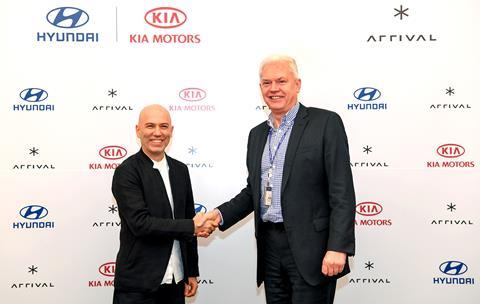
Hyundai Motor Company and Kia Motors Corporation have announced a "strategic investment" of €100m (£85m) in a new partnership with Arrival, a UK-based electric vehicle startup.
The automotive giants plan to introduce competitively priced small and medium-sized electric vans and other products for logistics and other service companies.
Arrival's scalable electric platform can be adapted for multiple vehicle categories and types which the three companies will explore for the development of a range of Purpose Built Vehicles (PBV).
The partnership aims to help Hyundai and Kia meet rapidly growing demand in Europe for eco-friendly commercial vehicles, and accelerate the brands’ transformation from car makers to "clean-mobility providers".
Arrival is currently carrying out pilot projects with multiple logistics companies in Europe using cargo vans manufactured with the technology.
Of the total investment, Hyundai will contribute €80m (£68m) and Kia €20m (£17m).
The partnership enables Hyundai to accelerate its ‘Two-track’ strategy to deliver battery electric and hydrogen fuel cell solutions for the European commercial vehicle market.
To further support that strategy, Hyundai recently established Hyundai Hydrogen Mobility (HHM), the joint venture between Hyundai and Swiss hydrogen energy company H2 Energy. It aims to export 1,600 hydrogen fuel cell trucks to Europe by 2025, following the first export to Europe on 3 January as part of a pilot program.
Hyundai and Kia are said to be exploring partnerships with various businesses to build a leadership position in the rapidly expanding global EV market.
The new deal was signed by Albert Biermann, president and head of the research and development division for Hyundai Motor Group, and Arrival CEO Denis Sverdlovsk at the headquarters of Hyundai and Kia in Seoul.
Read more
- Choice of electric vehicles still too limited, claim operators
- Menzies Distribution expands its national zero emissions fleet with three new electric vans
- Electric vans still only 1% of total UK light commercial sales in 2019
“The eco-friendly vehicle market in Europe is expected to grow rapidly due to the introduction of further environmental regulations,” Biermann explained. “Through the joint development of electric commercial vehicles with Arrival, we will be able to gain a competitive advantage and progressively establish our leadership in the global eco-friendly vehicle market, with Europe at the forefront.”
Sverdlovsk added: “Arrival has created a game changing product category - Generation 2.0 electric vehicles. Hyundai and Kia have been making amazing vehicles with uncompromising quality and share our vision for an electric mobility future. Our strategic partnership with Hyundai and Kia means we will scale Generation 2 electric vehicles globally and importantly - in the very near future.”
Founded in 2015, Arrival has production plants and R&D centres in the US, Germany, Singapore, Russia and the UK. The company believes its strength lies in its ‘skateboard’ vehicle platform with a modular component structure, a cost-effective base which incorporates a battery pack, electric motor and driveline components.
From 2021, the EU will introduce the world’s most stringent vehicle emissions regulations, limiting each automaker’s fleet-wide average CO2 emissions by around 27%, from 130 g/km to 95 g/km.
Youngcho Chi, president and chief innovation officer at Hyundai Motor Group said: “This investment is part of an open innovation strategy pursued by Hyundai and Kia. We will accelerate investment and cooperation with companies with advanced technology such as Arrival, to respond to the rapidly changing eco-friendly vehicle market."
Added Avinash Rugoobur, chief strategy officer of Arrival: “We are excited to come out of stealth mode with our partnership with Hyundai and Kia, a globally respected OEM with brilliant products on the road, and our complementary expertise will allow us to rapidly transition to full scale global production. Accelerating electric vehicle adoption is good for everyone - for people, business and the planet and we are pleased to undertake this mission with our partners Hyundai and Kia."














